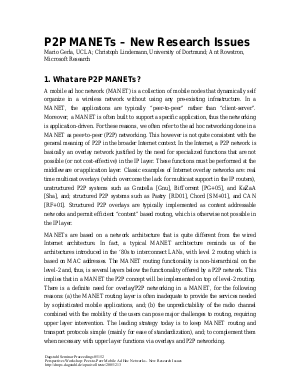P2P MANET's - New Research Issues
Authors Mario Gerla, Christoph Lindemann, Ant Rowstron
-
Part of:
Volume:
Dagstuhl Seminar Proceedings, Volume 5152
Part of: Series: Dagstuhl Seminar Proceedings (DagSemProc) - License:
 Creative Commons Attribution 4.0 International license
Creative Commons Attribution 4.0 International license
- Publication Date: 2005-07-18
File

PDF
DagSemProc.05152.1.pdf
- Filesize: 330 kB
- 25 pages
Document Identifiers
Subject Classification
Keywords
- P2P systems
- multihop wireless networks
- mobile applications
- workload characterization
Metrics
- Access Statistics
-
Total Accesses (updated on a weekly basis)
0Document
0Metadata
Abstract
A mobile ad hoc network (MANET) is a collection of mobile wireless nodes that can dynamically form a network without any pre-existing infrastructure. Due to the distributed nature of MANET, its networked applications typically employ the peer-to-peer (P2P) paradigm. Multiple P2P networks, corresponding to different applications, may coexist on a large ad hoc network structure (eg, battlefield, urban vehicular grid, etc). MANETs may be standalone, or may grow as an "opportunistic" extension of the wired Internet. In contrast with the wired Internet counterparts, P2P applications for MANETs are still in its infancy. Beyond popular P2P systems like KaZaA, one of the most promising recent developments for the Internet is a set of proposals for P2P look-up services based on Dynamic Hash Tables. In this invited workshop, we would like to focus on the applicability of the wired P2P models to the wireless scenarios and more generally to the challenging research problems emerging in the ad hoc P2P area. Particular topics of this workshop include, but are not limited to:
* Quantitative characterization of mobile P2P application scenarios (e.g., emergency, infotainment, military, ...)
* Design challenges of purely mobile P2P applications (e.g., mobile file sharing, mobile instant messaging, mobile gaming, ...)
* Design challenges for ad hoc networked extensions of wired P2P systems (e.g., Gnutella, KaZaA, dynamic hash tables, multi-player-gaming, ...)
Cite As Get BibTex
Mario Gerla, Christoph Lindemann, and Ant Rowstron. P2P MANET's - New Research Issues. In Perspectives Workshop: Peer-to-Peer Mobile Ad Hoc Networks - New Research Issues. Dagstuhl Seminar Proceedings, Volume 5152, pp. 1-25, Schloss Dagstuhl – Leibniz-Zentrum für Informatik (2005)
https://doi.org/10.4230/DagSemProc.05152.1
BibTex
@InProceedings{gerla_et_al:DagSemProc.05152.1,
author = {Gerla, Mario and Lindemann, Christoph and Rowstron, Ant},
title = {{P2P MANET's - New Research Issues}},
booktitle = {Perspectives Workshop: Peer-to-Peer Mobile Ad Hoc Networks - New Research Issues},
pages = {1--25},
series = {Dagstuhl Seminar Proceedings (DagSemProc)},
ISSN = {1862-4405},
year = {2005},
volume = {5152},
editor = {Mario Gerla and Christoph Lindemann and Antony Rowstron},
publisher = {Schloss Dagstuhl -- Leibniz-Zentrum f{\"u}r Informatik},
address = {Dagstuhl, Germany},
URL = {https://drops.dagstuhl.de/entities/document/10.4230/DagSemProc.05152.1},
URN = {urn:nbn:de:0030-drops-2139},
doi = {10.4230/DagSemProc.05152.1},
annote = {Keywords: P2P systems, multihop wireless networks, mobile applications, workload characterization}
}
